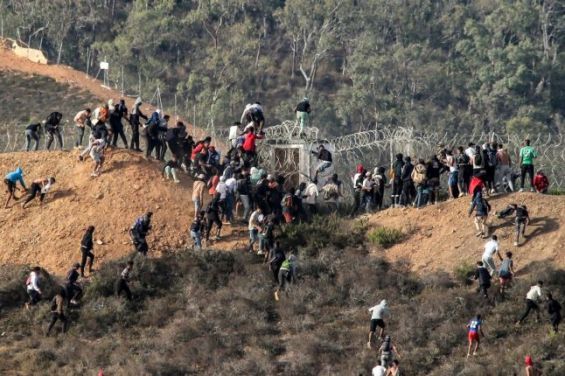Content related to irregular migration has become a prominent topic on Moroccan social media platforms. To delve deeper into this phenomenon, Yabiladi interviewed Amine Ghoulidi, a Moroccan geopolitics researcher at King's College London. He has previously conducted research on the intersection of social media and irregular migration in North Africa.
How would you describe these social media calls and the response they managed to elicit?
These social media calls and the response they elicited demonstrate social media's powerful ability to mobilize youth in general and around migration issues in particular. Smartphones are bombarding Moroccan youth with a constant stream of often unverified information via social media and closed messaging apps such as WhatsApp. The digital space has become a virtual «playground» for many young people, where they connect with like-minded peers unconstrained by geography. The significant response to these calls aligns with trends regarding social media's growing influence on migration decisions in North Africa.
Can we say that the response to these calls was unprecedented in terms of the content inciting migration?
The response to these calls was indeed unprecedented in terms of content inciting migration. Social media posts about irregular migration have not previously generated such a large-scale, coordinated response. This represents a concerning escalation of trends where online content is increasingly translating into real-world applications.
The situation exposes several structural failures, particularly at the level of individual family units and schools — both have failed to live up to their most fundamental roles as providers of guidance, support, and constructive narratives.
Have you observed this phenomenon growing, and do you believe it will become more sophisticated with the increasing influence of social media on young Moroccans?
This phenomenon has been growing over the past few years. An expanding ecosystem of migration-related content already exists across platforms like YouTube, Instagram, and TikTok. Migration-focused influencers with large followings are emerging and monetizing their content.
Based on these trends, the phenomenon will likely become more sophisticated as social media's influence on young Moroccans continues to grow. The potential for AI-powered tools to further amplify and personalize migration-related content may make it even more persuasive and difficult to counter. And I would like here to pinpoint the legal and moral responsibility of these social media and messaging platforms in working with qualified authorities in order to not only study and understand these phenomena, but also to engage it, contain it.
TikTok likely has a legally registered entity in Morocco and is thus subject to local laws and regulations — I don’t anticipate that they would object to, at the very least, work with local researchers or even qualified authorities in mapping out the virality of the content that led to the incidents of September 15.
What are your thoughts on other types of content on social media documenting the migration attempts of young Moroccans?
Social media content documenting migration attempts of young Moroccans is diverse and complex. It ranges from personal vlogs and live streams to instructional videos on crossing methods. This content often romanticizes life in Europe while downplaying risks. Some videos provide detailed operational information about border crossings, which can be dangerous if acted upon without verification.
The ecosystem includes both genuine accounts of migrants and potential disinformation campaigns. Verification of such content is challenging, given the volume and speed at which it spreads.
Many on social media have questioned the authenticity of these social media calls, arguing that they are not organic and may have been orchestrated. What is your take on this?
The authenticity of these social media calls can indeed be questionable. While some may be organic expressions of youth aspirations, there's potential for orchestrated campaigns to amplify what could otherwise be a marginal phenomenon.
Foreign actors could theoretically exploit social media to manipulate the virality of such content. However, definitively proving orchestration is challenging due to the decentralized nature of social media in the context of non-cooperation from the social media platforms themselves. The rapid spread of these calls could be a result of both genuine interest and potential amplification by non-organic means. Verification of the source and intent behind such calls requires sophisticated digital forensics that are, however, accessible to qualified authorities.
Despite the security alert from both sides, many young people are still roaming the area near the borders with Ceuta, trying to enter the city. Do you believe that irregular migration content on social media has made the dangerous journey seem easier than it actually is?
Irregular migration content on social media has indeed contributed to making the dangerous journey seem easier and more attractive than it actually is, or at the very least exciting. Influencers and successful migrants often share glamorized accounts of their experiences, while downplaying or omitting the risks and hardships.
The immediacy and perceived authenticity of social media content can create a false sense of accessibility and safety. This skewed representation can lead young people to underestimate the dangers and difficulties of irregular migration, potentially putting themselves at significant risk. It is also important to highlight here the immediacy of experience of the average Moroccan youth and other third-country would-be migrants due to Morocco’s geographic proximity to Spain. Ceuta’s legal status notwithstanding, technically Morocco is the only African country that shares physical borders with Europe.
Despite the failed attempts of many young people to cross to Ceuta, new social media calls are calling for another influx on September 30th. Do you foresee these calls being repeated in the future?
These calls are likely to be repeated in the future. The cyclical nature of such social media campaigns suggests a pattern that may continue. Each wave, regardless of its success, generates content and discussion that fuels future attempts. The persistence of underlying socio-economic factors driving migration, combined with the ongoing influence of social media, creates an environment where such calls can gain traction repeatedly. Future calls may become more sophisticated, even amplified by foreign actors potentially leveraging AI and targeted social media advertising/sponsorship to reach vulnerable youth.
How can parents and eventually the Moroccan government address content on social media that incites young people to take the perilous journey of irregular migration?
Social media platforms have a legal and moral responsibility to moderate content that could lead to harmful or illegal activities, including content that encourages dangerous irregular migration. These platforms are obligated to implement robust content moderation policies and technologies to identify and remove posts that explicitly incite or facilitate irregular border crossings. However, addressing this issue requires a collaborative approach that extends beyond the platforms themselves. Destination countries, particularly Spain and the broader European Union, share responsibility in managing migration-related content. Morocco can work with EU institutions to establish comprehensive agreements that compel full cooperation from social media platforms. Such partnerships could leverage the EU's regulatory influence and technological expertise to develop more effective content moderation strategies and cross-border information sharing mechanisms.
Alongside these efforts, it is crucial to invest in large-scale digital literacy programs targeting parents and teachers. These programs should aim to equip adults with the skills to navigate the digital landscape, understand the risks associated with online content, and guide young people in critically evaluating information they encounter on social media.




 chargement...
chargement...












